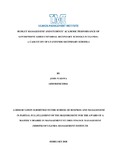| dc.contributor.author | Waiswa, John | |
| dc.date.accessioned | 2020-09-10T23:32:49Z | |
| dc.date.available | 2020-09-10T23:32:49Z | |
| dc.date.issued | 2018-02 | |
| dc.identifier.citation | Waiswa, John (2018) Budget Management and Students' Academic Performance of Government Aided Universal Secondary Schools in Uganda: A case study of Lyantonde Secondary Schools | en_US |
| dc.identifier.uri | https://hdl.handle.net/20.500.12305/901 | |
| dc.description | A dissertation submitted to the School of Business and Management in Partial Fulfilment of the Requirements for the Award of a Master’s Degree in Management Studies (Financial Management) of Uganda Management Institute | en_US |
| dc.description.abstract | The study examined the effect of budget management on students’ academic performance of
government aided universal secondary schools in Uganda; with a special focus on Lyantonde
USE secondary schools. Specific objectives included; assessing the effect of budget planning on
students’ academic performance; assessing the effect of budget staffing on students’ academic
performance and establishing the effect of budget expenditure on students’ academic
performance, in Lyantonde USE schools. A cross sectional survey was adopted and
supplemented using both qualitative and quantitative approaches. Survey and interview methods
were used with a questionnaire and interview guide in data collection. A total number of 283
study elements were identified where 241 respondents formed a sample size. A response rate of
70.0% was obtained. Findings included a positive significant effect of budget planning, budget
staffing and budget expenditure on students’ academic performance.
The study concludes that; delayed budget planning negatively affects students’ academic
performance while poorly designed budget strategies lead to poor academic performances and
well-designed budget guidelines, better budget objectives and action plans. In addition, staff with
budget skills, abilities and competences actively engaged in budget exercise. Furthermore,
misappropriation of funds and failed accountability would negatively affect budget activities,
while teacher rewards were inadequate. Recommendations include; actively engaging all
stakeholders; the need to review obsolete budget guidelines; need for capacity building and
stakeholders needed to comply with school financial guidelines and procedures; create
agriculture Farm SACCOs to boast their welfare. Lastly, school staff who fail to account for
USE funds advanced to them should expect recovery from their monthly earnings. | en_US |
| dc.language.iso | en | en_US |
| dc.publisher | Uganda Management Institute | en_US |
| dc.subject | Budget Management | en_US |
| dc.subject | Students' Academic Performance | en_US |
| dc.subject | Government Aided Universal Secondary Schools | en_US |
| dc.subject | Lyantonde Secondary Schools | en_US |
| dc.subject | Uganda | en_US |
| dc.title | Budget management and students' academic performance of government aided Universal Secondary Schools in Uganda: A case study of Lyantonde Secondary Schools | en_US |
| dc.type | Thesis | en_US |

